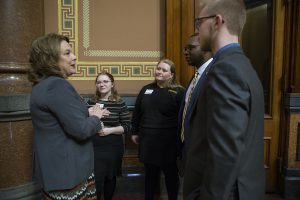UI College of Engineering and nurse scientists collaborate with UW-Madison Health to study support of triage nurses amid COVID-19
A University of Iowa research team is collaborating with the University of Wisconsin-Madison to study triage nurses over the next several months and formulate a unified approach in the field to best answer patient questions during a pandemic.
University of Iowa Hospitals and Clinics are seen on Tuesday, June 23, 2020. (Tate Hildyard/The Daily Iowan)
June 25, 2020
Researchers in the University of Iowa College of Engineering and UI Hospitals and Clinics recently began studying triage nurses during the coronavirus pandemic. Their study, funded by the National Science Foundation RAPID grant, aims to better understand the complexities of this field and improve conditions in case of future pandemics.
Priyadarshini Pennathur, UI associate professor in industrial and systems engineering is working with UI Nurse Scientist Stephanie Edmonds and Laura Cullen, an evidence-based scientist at UI Hospitals and Clinics. The trio are collaborating with Elise Arsenault Knudsen, clinical nurse specialist for research and evidence-based practices at the University of Wisconsin-Madison Health.
Pennathur said the team started this project because it wanted to gain a better understanding of the complexities of triage nursing, especially during the coronavirus pandemic.
“The COVID situation is pretty new to us, especially the uncertainty in information about COVID symptoms,” Pennathur said. “Our research team closely engaged in dialogue and collaboration to think about how an interdisciplinary team like us could address this problem.”
The team plans to study triage nursing at UI and UW health care 24-hour call centers. Triage nurses are responsible for listening to patients describe their symptoms, looking at their medical history, and quickly assessing how they should receive treatment, Edmonds said.
This area is especially important now because COVID-19 is evolving so quickly, Edmonds said. Nurses want to tell patients the right information but sometimes don’t know the answers, she said.
The team became involved in the research after the National Science Foundation announced a call for research on COVID-related problems. The researchers wrote a proposal for their study, and the foundation awarded them funding based on the study’s scientific merit and whether it would make a significant impact.
Cullen said she and her colleagues decided to apply for the National Science Foundation RAPID grant because they wanted to get information about triage nursing during this pandemic as quickly as possible.
“The RAPID cycle was created as a mechanism given the need for research to occur very quickly,” Cullen said. “It was intentionally a rapid process because of how quickly we needed to understand and address the pandemic.”
Pennathur said the team hasn’t started data collection because it’s waiting for approval to study human subjects. For this study, the researchers are listening to phone calls and screening patient records from the start of the pandemic.
RELATED: Second phase announced for reopening UI research facilities
The expected outcome of this study is to understand why triage nurses make decisions, Arsenault Knudsen said, and how they can create a more unified approach across the nation to improve patient outcomes.
“We are hoping to better understand how nurses make triaging decisions during pandemics so we can design future triaging systems and processes that will be responsive to patient needs, while helping nurses who are serving as a vital part of our fight against the pandemics,” Cullen said. “Our expectation is that as future pandemics would emerge, we would have this information available to be able to more rapidly create the needed information and design that in a way that is most usable.”
The team is excited for this opportunity and hopes its research will make a difference in the field, Pennathur said.
“Nurses have absorbed a lot of the impact of the pandemic, and nurses are the front line of people who are answering questions,” Arsenault Knudsen said. “I think that this is a great opportunity to identify how we can support these nurses so that they feel confident in their decision-making so that they have the best resources available to them to support their patient populations.”
Editor’s Note: A previous version of this article said the research was a collaboration between the UI Colleges of Nursing and Engineering. It is actually a collaboration between the College of Engineering and nurse scientists within UI Hospitals and Clinics. The DI regrets this error.






